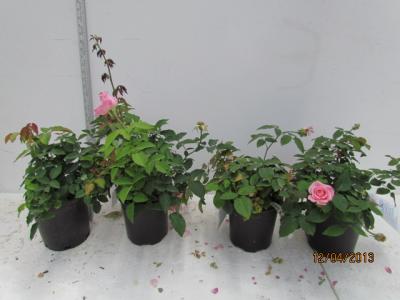Earth-Kind roses analyzed for salt tolerance

'Belinda's Dream' was recommended for high salinity soil. Control plants are show on the left of the photo. The two plants on the right were irrigated with saline nutrient solution at an electrical conductivity of 10.0 dS/m. Credit: Photo courtesy Genhua Niu
Earth-Kind® roses are favorites with gardeners and landscapers. Chosen for their superior tolerance to heat, drought, and pests, as well as their outstanding performance in landscapes, Earth-Kind® roses can thrive in most environments, even with limited care. A new study focused on determining the best Earth-Kind® varieties for withstanding the challenges of salt stress.
As alternative water sources such as reclaimed water are becoming more commonly used as irrigation for urban landscapes and agricultural crops, plants are being subjected to higher levels of soluble salts, which can ultimately cause salt stress in plants.
In arid and semiarid regions, high soil salinity is the result of low rainfall and high evapotranspiration, while in northern regions it is caused by deicing salts. Increasing soil salinity negatively affects plant growth and development, so screening and identifying salt-tolerant plant species and cultivars is becoming increasingly important.
Looking to inform rose enthusiasts and growers, researchers at Texas A&M University evaluated 18 popular varieties of Earth-Kind® roses for salt tolerance. Their findings were published in HortScience (May 2014.) The rose cultivars were tested in greenhouses in College Station and El Paso, Texas, in response to two salinity levels at electrical conductivity: 1.2 and 10.0 dS·m-1.
“The salt tolerance of Earth-Kind® rose cultivars was consistent in the two locations with strong positive correlations of relative shoot dry weight, flower number, and visual quality score in the 10 same cultivars between two locations,” said corresponding author Genhua Niu. 'Belinda's Dream', 'Climbing Pinkie', 'Mrs. Dudley Cross', 'Reve d'Or', and 'Sea Foam' were the most salt-tolerant cultivars. 'Cecile Brunner', 'Else Poulsen', 'Madame Antoine Mari', 'Perle d'Or', 'Spice', and 'Souvenir de St. Anne's' were the least salt-tolerant among the 18 cultivars analyzed in the study.
“Identifying and using salt-tolerant garden roses is important in landscapes where soil salinity is high or irrigation water quality is poor,” said the authors. They recommended 'Belinda's Dream', 'Climbing Pinkie', 'Mrs. Dudley Cross', 'Reve d'Or', and 'Sea Foam' as good selections for planting in landscapes with high soil salinity. 'Cecile Brunner' and 'Else Poulsen' were not recommended, as they had the lowest relative shoot dry weight and flower number of the cultivars tested.
The complete study and abstract are available on the ASHS HortScience electronic journal web site: http://hortsci.ashspublications.org/content/49/5/544.abstract
Founded in 1903, the American Society for Horticultural Science (ASHS) is the largest organization dedicated to advancing all facets of horticultural research, education, and application. More information at ashs.org
Media Contact
All latest news from the category: Life Sciences and Chemistry
Articles and reports from the Life Sciences and chemistry area deal with applied and basic research into modern biology, chemistry and human medicine.
Valuable information can be found on a range of life sciences fields including bacteriology, biochemistry, bionics, bioinformatics, biophysics, biotechnology, genetics, geobotany, human biology, marine biology, microbiology, molecular biology, cellular biology, zoology, bioinorganic chemistry, microchemistry and environmental chemistry.
Newest articles

Bringing bio-inspired robots to life
Nebraska researcher Eric Markvicka gets NSF CAREER Award to pursue manufacture of novel materials for soft robotics and stretchable electronics. Engineers are increasingly eager to develop robots that mimic the…

Bella moths use poison to attract mates
Scientists are closer to finding out how. Pyrrolizidine alkaloids are as bitter and toxic as they are hard to pronounce. They’re produced by several different types of plants and are…

AI tool creates ‘synthetic’ images of cells
…for enhanced microscopy analysis. Observing individual cells through microscopes can reveal a range of important cell biological phenomena that frequently play a role in human diseases, but the process of…





















